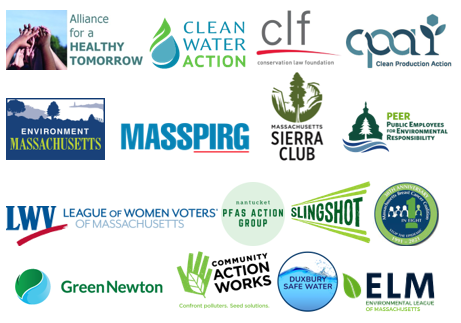Deirdre Cummings
Legislative Director, MASSPIRG
617-747-4319
[email protected]
Legislative Director, MASSPIRG
617-747-4319
[email protected]

Photo by TPIN staff | TPIN
Advocates call on lawmakers to ban toxic PFAS and protect public health
BOSTON – A broad coalition of public health, consumer, and environmental and community organizations along with academics, scientists and firefighters urged lawmakers to protect public health from toxic PFAS at a State House hearing today.
Testifying before the legislature’s Joint Committee on Public Health, the advocates and members of the public urged the committee to act quickly to pass the Act to protect Massachusetts public health from PFAS (S1356/H2197) filed by Senator Cyr (Truro) and Representative Kate Hogan (Stow). The bill would phase out PFAS in most products, cut industrial discharges of PFAS; and set up a fund to help communities test and treat for PFAS in drinking water, soil, and groundwater.
PFAS are a class of over 12,000 synthetic petrochemicals that help products resist heat, water, grease and stains. The downside is that PFAS are toxic at very low levels, increasing risk of cancer, immunosuppression, birth defects, colitis, and other diseases.
People are exposed by drinking and eating food and water that has been contaminated and using products with PFAS. PFAS in products escapes into air and dust, which we breathe in. When products containing PFAS are manufactured and disposed of, PFAS leach into the soil, groundwater and drinking water. In Massachusetts, at least 169 public water systems in 95 cities and towns, and many private wells, have exceeded the state’s legal limit (Maximum Contaminant Level) for PFAS.
“The most important part of the bill is that it “turns off the tap” of toxic PFAS by banning its use in almost all products,” said Deirdre Cummings, Legislative Director, MASSPIRG, “preventing the problem from getting even worse.”
“Other states have already enacted laws to restrict PFAS in some or all products,” said Laura Spark, Clean Water Action. “Now it’s time for Massachusetts to take action to protect our residents. PFAS contamination in Massachusetts will continue to worsen until PFAS restrictions go into effect.”
“This bill will protect Firefighters from Occupational Cancer by removing PFAS from our turnout gear and reducing our exposure to these harmful chemicals,” said Paul Jacques, Legislative Agent for the Professional Fire Fighters of Massachusetts (PFFM). “If passed as written, this legislation would be the strongest language in the Country to address this important issue.”
All PFAS have a fluorine atom bonded to a carbon. This is one of the strongest bonds in nature — and, as a result, PFAS chemicals are extraordinarily persistent. Known as ‘forever chemicals’ they never fully break down, remaining in the environment for thousands of years.
Key components of An Act to protect Massachusetts public health from PFAS include:
Coalition Statement:
“Senator Cyr and Representative Hogan have taken the lead on tackling PFAS. As chairs of the PFAS Interagency Task Force , they completed an extensive analysis on PFAS in Massachusetts, culminating in a report that found “The extent of PFAS contamination is vast and the time to act is now”. We couldn’t agree more and very much look forward to working with them, the Committee, and members of the legislature to pass the bill into law, this session..”
The coalition includes: Alliance for a Healthy Tomorrow, MASSPIRG, Clean Water Action, Massachusetts Sierra Club, Built Environment Plus, Conservation Law Foundation, Community Action Works, Environment Massachusetts, Clean Production Action, Environmental League of Massachusetts, Green Newton, Healthlink, League of Women Voters, Massachusetts Breast Cancer Coalition, Nantucket PFAS Action Group, Northeast Organic Farming Organization/Massachusetts Chapter, Public Employees for Environmental Responsibility, Seaside Sustainability, Slingshot.